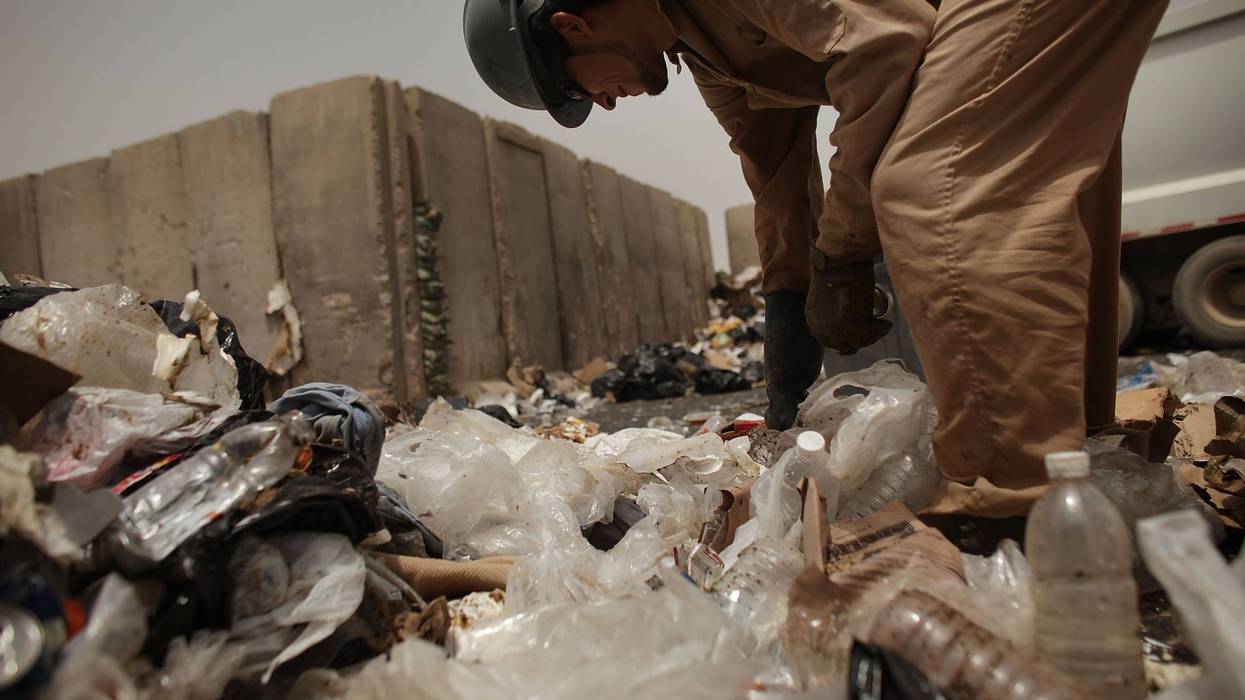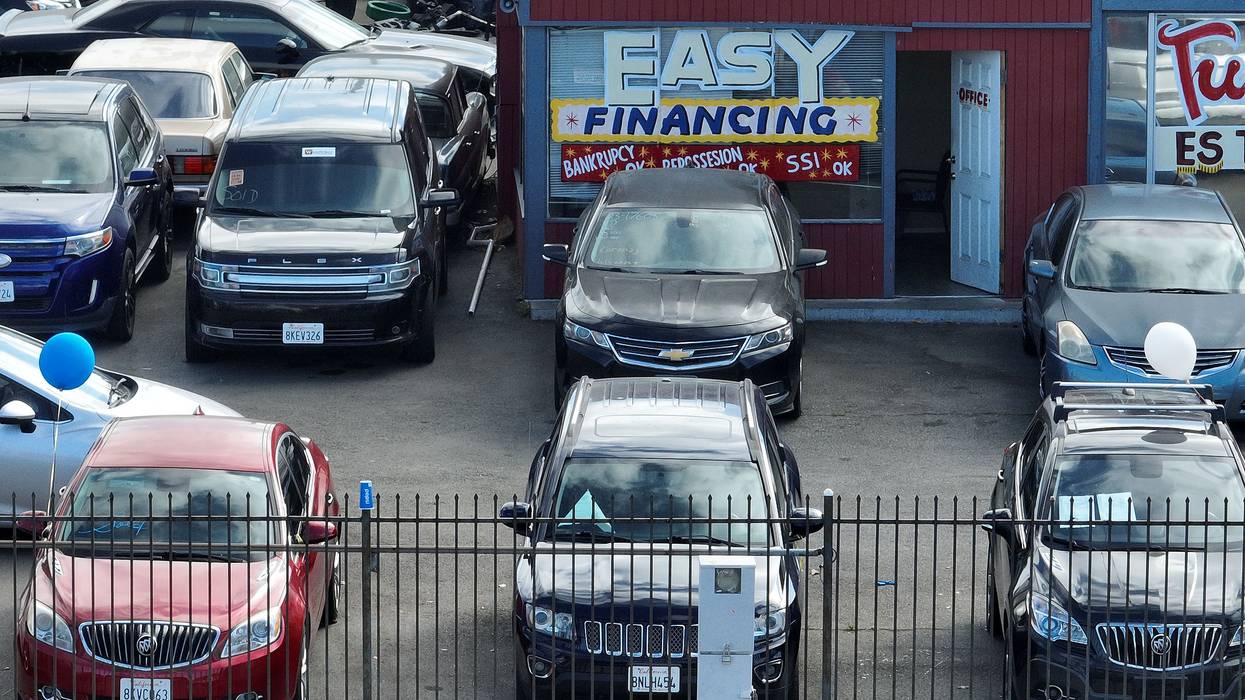American Garbage
We consume far beyond our means because our military keeps enough of us feeling secure, and we have such a large military because we consume far beyond our means.
I learned one of my most valuable lessons about US power in my first year as a Brown University doctoral student. It was in anthropology professor Catherine Lutz’s seminar on empire and social movements. I’d sum up what I remember something like this: Americans consume one hell of a lot—cars, clothes, food, toys, expensive private colleges (ahem…), and that’s just to start. Since other countries like China, the United Kingdom, and Japan purchase substantial chunks of US consumer debt, they have a vested interest in our economic stability. So, even though you and I probably feel less than empowered as we scramble to make mortgage, car, or credit-card payments, the fact that we collectively owe a bunch of money globally makes it less likely that a country like China will want to rock the boat—and that includes literally rocking the boat (as with a torpedo).
In classes like that one at Brown, I came to understand that the military power we get from owing money is self-reinforcing. It helps keep our interest rates low and, in turn, our own military can buy more supplies (especially if President Donald Trump’s latest demand for a $1.5 trillion Pentagon budget goes through!). Our own debt somewhat ironically allows this country to continue to expand its reach, if not around the globe these days, at least in this hemisphere (whether you’re thinking about Venezuela or Greenland). Often when I splurge on a fancy Starbucks latte or a new pair of shoes, I think about how even critics of US military hegemony like me help prop up our empire when we do what Americans do best—shop!
To put this crudely, we consume far beyond our means because our military keeps enough of us feeling secure, and we have such a large military because we consume far beyond our means.
American Trash and the Politics of Consumption
And boy, can we shop! As of August 2025, US consumer debt ballooned to nearly $18 trillion and then continued to rise through the end of last year.
Here’s one consequence of our consumptive habits: We Americans throw a lot of stuff out. Per capita, we each generate an average of close to two tons of solid waste annually, if you include industrial and construction waste (closer to one ton if you don’t). Mind you, on average, that’s roughly three times what most other countries consume and throw out—much more than people even in countries with comparable per capita wealth.
Reminders of our waste are everywhere. Even in my state, Maryland, which funnels significant tax dollars into environmental conservation, you can see plastic bags and bottles tangled in the grass at the roadside, while the air in my wealthy county’s capital city often smells like car exhaust or the dirty rainwater that collects at the bottom of your trash can. Schoolchildren like mine bring home weekly piles of one-sided worksheets, PTA event flyers, plastic prizes, and holiday party favors. Even the rich soil of our rural neighborhood contains layers of trash from centuries of agricultural, household, and military activity, all of which remind me of the ecological footprint we’re leaving to our children and grandchildren.
Not all of us create or live with garbage to the same degree.
To our credit, some of us try to be mindful of that. In recent years, three different public debates about how to fuel our consumptive habits (and where to put the byproducts) have taken place in my region. Residents continue to argue about where to dispose of the hundreds of thousands of tons of our county’s waste (much of it uneaten food) that’s currently incinerated near the scenic farmland where I live. Do we let it stay here, where it pollutes the land and water, not to mention the air, and disturbs our pastoral views? Or do we haul at least some of the residual ash to neighboring counties and states, to areas that tend to be poor majority-minority ones? While some local advocacy groups oppose the exporting (so to speak) of our trash, it continues to happen.
A related dispute has taken place in an adjacent county that’s somewhat less wealthy but also majority white. That debate centers on the appropriate restrictions on a data center to be built there that will store information we access on the internet and that’s expected to span thousands of acres. How far away need it be from residents’ homes and farms? Will people be forced to sell their land to build it?
While many of our concerns are understandable—I’m not ready to move so that we can have a data center nearby—it turns out that some worries animating such discussions are (to put it kindly) aesthetic in nature. Recently, a neighbor I’d never met called me to try to enlist our family in a debate about whether some newcomers, a rare Indian-American family around here, could construct a set of solar panels in a field along a main road, where feed crops like alfalfa can usually be seen blooming in the springtime.
My neighbor’s concern: that the new family wanted to use those fields for solar panels to supply clean energy to their community (stated with emphasis, which I presumed to denote the Asian-Americans who would assumedly visit them for celebrations and holidays). Heaven forbid! She worried that the panels would disrupt the views of passersby like us and injure a habitat for the bald eagle—ironic concerns given how much of a mess so many of us have already made renovating our outbuildings, raising our dogs and chicken flocks, and chopping down trees that get in the way of our homes or social gatherings.
Many such concerns are raised sincerely by people who care deeply about land and community. However, the fact that, to some, solar panels are less desirable than the kinds of crops that look nice or feed our desire for more red meat should reframe the debate about whose version of consumption (and garbage) should be acceptable at all.
Indeed, not all of us create or live with garbage to the same degree. Compared to white populations, Black populations are 100% more likely and communities of Asian descent 200% more likely to live within 6 miles of a US Superfund site (among America’s most polluted places). Such proximity is, in turn, linked to higher rates of cancer, asthma, and birth defects.
Nor do whites suffer such impacts in the same ways. According to an analysis by the Environmental Protection Agency—and let’s appreciate such an analysis while we still have access to it, since the Trump administration’s EPA just decided to stop tracking the human impact of pollution—Black Americans live with approximately 56% more pollution that they generate, Hispanic Americans experience 63% more than what they create, and—ready for this?—white Americans are exposed to 17% less than they make.
Military Contamination
Our military, far from being just another enabler of unequal consumption and suffering, contributes mightily to the waste we live with. In the US, hundreds of military bases are contaminated by so-called forever chemicals, such as PFAS, in the drinking water and the soil. We’re talking about chemicals associated with cancer, heart conditions, birth defects, and other chronic health problems. The civilian populations surrounding such bases are often low-income and disproportionately people of color. Of course, also disproportionately impacted are the military families and veterans who live and work around such bases, and tend to have inadequate healthcare to address such issues.
An example would be the Naval Submarine Base in New London, where my family spent a significant amount of time. Encompassing more than 700 acres along the Thames River, that base was designated a Superfund site in 1990 due to contamination from unsanctioned landfills, chemical storage, and waste burial, all of which put heavy metals, pesticides, and other toxic substances into the environment.
Rather than bore you with more statistics, let me share how it feels to stand on its grounds. Picture a wide, deep river, slate gray and flanked by deciduous trees. On the bank opposite the base, multifamily housing and the occasional restaurant have been wrought from what were once factories. After you pass the guard station, a museum to your left shows off all manner of missiles, torpedoes, and other weaponry, along with displays depicting the living spaces of sailors inside submarines, with bunks decorated with the occasional photo of scantily clad White women (presumably meant to boost troop morale).
To your right, there are brick barracks, office buildings, takeout restaurants, even a bowling alley, and submarines, their rounded turrets poking out of the water. Along roadways leading through the base, old torpedoes are painted in bright colors like children’s furniture and repurposed as monuments to America’s military might. The air smells like asphalt and metal. Signs of life are everywhere, from the seagulls that swoop down to catch fish to the sailors and their families you see moving about in cars. It’s hard to comprehend that I’m also standing on what reporters have called “a minefield of pollution… a dumping ground for whatever [the base] needed to dispose of: sulfuric acid, torpedo fuel, waste oil, and incinerator ash.”
Empire of Waste
When I say that our military produces a lot of garbage, I don’t just mean in this country. I also include what it does abroad and the countries like Israel that we patronize and arm. Last summer, I corresponded with anthropologist Sophia Stamatopoulou-Robbins, who spent more than a year documenting the human casualties and costs of what the Israeli military and other Israelis have done in Israeli-occupied Palestine. That includes the mass dumping of garbage there from Israeli territories and the barricading of Palestinian communities from waste disposal sites, all of which have led to environmental contamination.
I think progressives would do well to consider how important it is that our signs, our social media posts, our political speeches, and even our patterns of consumption send a message—that many are welcome here, skin color, pronouns, and even specific brands of left-wing ideology be damned.
For example, Stamatopoulou-Robbins visited the 5,000-person Palestinian village of Shuqba, surrounded by open land on all sides and controlled by the Israeli government. Nearby cities and settlements dump waste, including X-ray images, household appliances, broken electronics like cell phones, industrial waste, wrecked vehicles, and car parts right in its neighborhood. One young man told Stamatopoulou-Robbins that he and his wife couldn’t have a baby because of the toxic environment. Many others, he told her, experienced the same problem, along with higher-than-average rates of cancer and respiratory and skin problems. His story, Stamatopoulou-Robbins wrote me, was one of many similar tales in Shuqba, tales that multiplied across the West Bank, where Israeli settlements and trucks from Israel, as she put it, “regularly dump their wastes in proximity to Palestinian residential areas and farmland.”
Her research drives home how we experience pollution all too often depends on who we are. I’m a case in point. My family and I pride ourselves on being the first to inhabit our sprawling rural property since the family whose ancestors built a home on it in 1890 and passed it down to two subsequent generations. In 2020, when we initially came to look at it, we couldn’t afford the asking price. However, the older couple who, in the end, sold it to us wanted a family in the house who would raise children there as they had. As they put it flatteringly, we were a “salt-of-the-earth” family (and the feeling was mutual).
Trash and Belonging
Nowadays, the news abounds with references to who is a “real” American, and who belongs beyond our borders. References to purity and contamination apply not just to our growing piles of waste but to human beings, too. Consider candidate Donald Trump’s promise, at a 2023 campaign rally, to “root out the communists, Marxists, fascists, and the radical left thugs that live like vermin within the confines of our country,” or his claim that Rep. Ilhan Omar (D-Minn.) and other Somali immigrants are nothing less than—yes—“garbage.”
And it’s true that what (or who) we consider garbage, and what (or who) we tolerate in our field of vision matters. My family recently renovated an old cabin behind our house to serve as an office for me to see my psychotherapy patients in person. The idea was that the veterans and military families who come to me for help with trauma, many of whom themselves are lower-income people of color, would have a peaceful place to process it.
As we demolished an outer wall to add a bathroom to my new office, something fell out of that wall: an old paper advertisement for black licorice candy (“Licorice Bites”) that depicted a Black baby, eyes wide in the stereotypical fashion of Jim Crow Era ads, trying to crawl away from an alligator, its mouth gaping open. Good thing, I thought, that it hadn’t fallen out of that drywall when a patient of mine was there. The experience, while fleeting, reminded me of writer Ta-Nehisi Coates’s point that Americans so easily minimize foreign genocides because we’ve done such a striking job of burying (in the case of my house, literally!) the atrocities of slavery, the segregated world that followed it, and their role in our country’s expansion.
Whoever put it there, that ad in my cabin wall—just like local gossip about that Indian-American family—is a reminder of who belongs and who doesn’t in this country. Like an Egyptian pyramid filled with a pharaoh’s possessions, remnants of American lives remind us of how some of us are kept sick, intimidated, and belittled, while feeding the appetites of others.
In the meantime, I think progressives would do well to consider how important it is that our signs, our social media posts, our political speeches, and even our patterns of consumption send a message — that many are welcome here, skin color, pronouns, and even specific brands of left-wing ideology be damned. Who is “of this earth” is questionable at best.
We should also ask why pictures denigrating Black people and half-naked women, and monuments to weaponry, so excite the patriotic souls of enough Americans that it’s easy to find them throughout our land. We cannot continue to allow the other side’s exclusionary ideals to dominate today’s political messaging.


